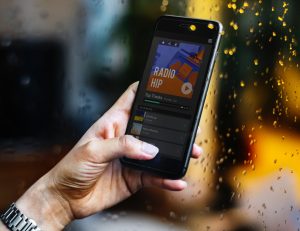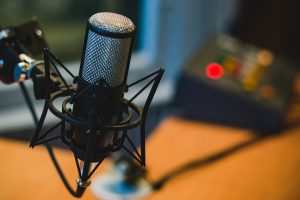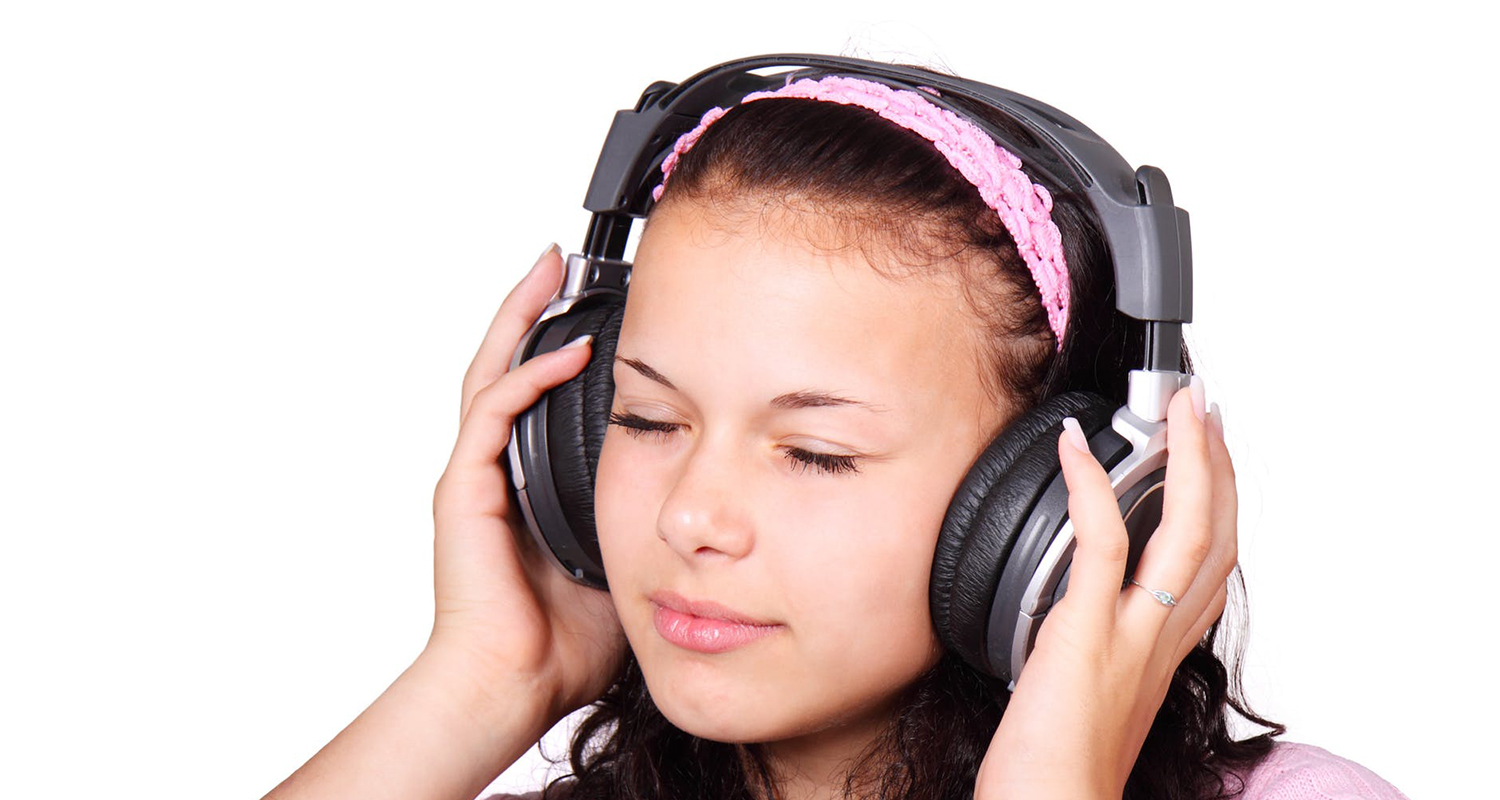In the previous post I spoke about:
- What is a podcast and what is it for?
- What do you need to make a podcast?
2. What do you need to make a podcast?
The quality of the recording is important, so your lethal weapon for a successful Podcast will be the microphone.
It is not necessary to memorize numbers and complicated concepts, I will explain the most important characteristics that you must take into account.
Most computers include a microphone among their accessories, if that is your case, it will be perfect to start with.
The headphones you buy with a built-in microphone will work for you, too.
If your computer is MAC, I recommend using a microphone with a USB port to avoid technical problems.
Now, how do you know if it’s a good microphone for a Podcast?

The first thing you should consider is that it is a unidirectional microphone, which means that the microphone receives sound in only one direction.
This is important because this way you will avoid external sounds to your voice.
For example, the microphone included in laptops receives sound in all directions, if you don’t have another option it’s not bad to use it, but the sound quality won’t be as good.
Another feature you’ll see in microphones is that they can be dynamic or condensers.
Dynamic microphones are the ones we see almost everywhere, because they are more resistant and have a foam rubber beret that filters the external sounds, they are perfect if you don’t work in a sound studio.
On the other hand, the condenser microphone allows you to choose the direction in which it receives the sound and professionals with a sound studio use it for its maximum quality.
If you chose to use a separate microphone rather than headphones, you will also need a pair of headphones.
This tool will not be essential to your recording project, but it is important that you can listen to your Podcast the way your listeners will.
This way you will be able to find any inconvenience or failure in your recording.
Generally speaking, what you need to consider when buying your Podcast headphones is: precision in response, comfort, noise cancellation, design and aesthetics.
Accurate response means that the headphones actually reproduce the sound you’re actually recording.

For example, there are headphones for DJs, professional players and so on; each headphone style highlights some feature in the audio for the user to have more entertainment, which you won’t need when you’re recording the Podcast.
On the other hand, the comfort of the headphones will help you work longer and reduce fatigue, if they are uncomfortable your work will be heavier.
Noise cancellation will help you, as much as possible to eliminate outside noise, so you can tell if there is an uncomfortable noise in your Podcast.
Finally, design and aesthetics. These features come hand-in-hand and are important if you are making a video Podcast.
What you have to keep in mind is that the headphones do not steal the attention of your audience, so it is necessary that they are as discreet as possible, so people can pay more attention to you.
As for the program to use to record our Podcast there are many, some paid and others free.
The most used is Audacity, a powerful audio editor that, besides being free, fulfills many functions to personalize your audio file.
Additionally you will need a program to tag your Podcast, this option is important because this way, your Podcast will be much easier to identify and classify.
For this task you can use Audacity, but there is another program that allows you to further customize the tags, for example, integrate an image to use it as a cover. This program is called MP3tag.
Finally, although it is not mandatory, if you want to give a professional touch to your work you can use Levelator, this program will help you level all your audio at the same volume.
If during your recording, your tone of voice increased or decreased more than desired, with Levelator you can correct these details.
These programs are necessary to make an outstanding and complete Podcast, on the web you can find many other alternatives and combine them.
What you should keep in mind is that you feel comfortable with your work and thus obtain excellent results.
When you have finished your Podcast you must upload it to a platform so that it can be heard.
In order to choose the platform, the first thing you must take into account is that it is specialized for Podcast, since apart from allowing hosting of large files, it facilitates the reproduction to many clients, either by download or in reproduction.
I’m going to give you a list of the podcast platforms that are most used by users:
![Making A Successful Podcast Step By Step [Guide 2019] (Part II)](https://blog.swipetown.com/wp-content/uploads/2019/07/Making-A-Successful-Podcast-Step-By-Step-Guide-2019-Part-II_4-300x200.jpg)
- Ivoox. This platform is in Spanish, here you can not only host your Podcast but also listen to content of your interest with great comfort. It has a basic subscription, ideal for you to try it and if you feel comfortable you can opt for a paid subscription and thus have certain benefits.
- Libsyn. It is another recognized site that has a lot of files hosted, also provides a lot of tools to share your Podcast. In short, one is ideal if you are looking for a very complete site. Maybe the only limitation is that it is in English.
- Spreaker. Another interesting platform worth considering, just like Ivoox you can start with a free account, which allows you to host a limited audio time. It has several tools, you can broadcast live and as an additional feature is in Spanish.
- SoundCloud. This site started aimed at the music world, and as it became more popular thanks to the large number of subscribers it has, it didn’t take long for users to start sharing their own Podcast.
- iTunes. It is an extensive encyclopedia of audios of different topics, unlike other platforms, iTunes does not host your file, rather propagates it, i.e iTunes instead of hosting the file as such, uses the link to the website where it is hosted, so it can be reproduced.
You can also create a blog as a site to host your Podcast, with which you will have more control, in addition this option is definitely cheaper, and if your website has a high number of visits much better.
You can continue reading at: Making A Successful Podcast Step By Step [Guide 2019] (Part III)


![Making A Successful Podcast Step By Step [Guide 2019] (Part II)](https://blog.swipetown.com/wp-content/uploads/2019/07/Making-A-Successful-Podcast-Step-By-Step-Guide-2019-Part-II_2-300x199.jpeg)